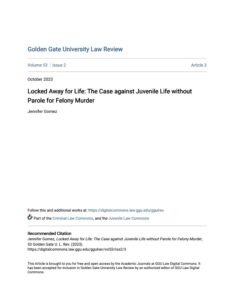Locked Away for Life: The Case Against Juvenile Life Without Parole for Felony Murder
This article makes the argument against the imposition of life without parole for young people who commit felony murder using an adolescent development framework. The author analyzes existing case law to outline that, just as the U.S. Supreme Court found the death penalty inappropriate for felony murder and relied on adolescent brain development research in Roper v. Simmons, Graham v. Florida, and Miller v. Alabama, sentencing children to life without parole for felony murder is equally disproportionate under the Eighth Amendment. This article calls for a blanket rule that youth have diminished culpability when it comes to felony murder liability based on the inherent characteristics of adolescence, including lack of foreseeability and research on desistance. This article provides youth defenders with a legal framework under the Eighth Amendment to challenge life without parole sentences imposed against youth on felony murder cases.

